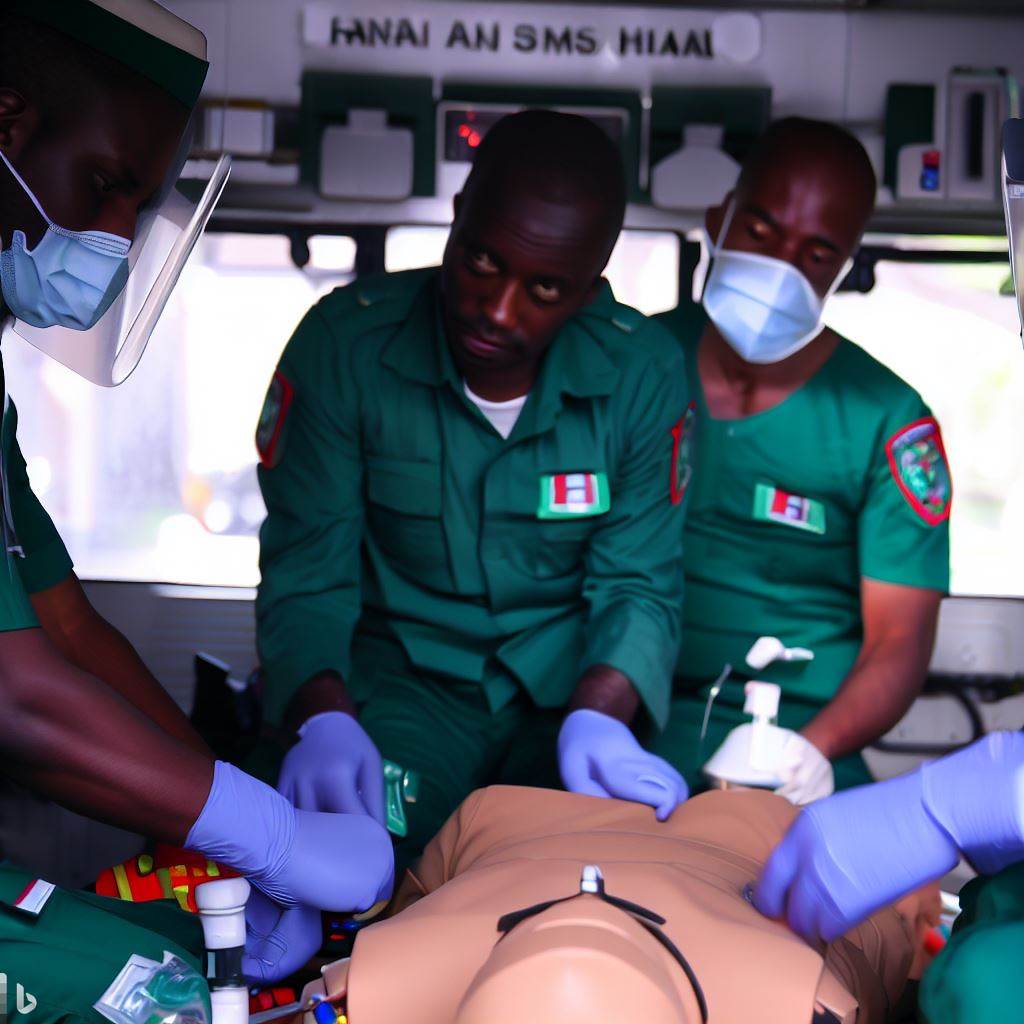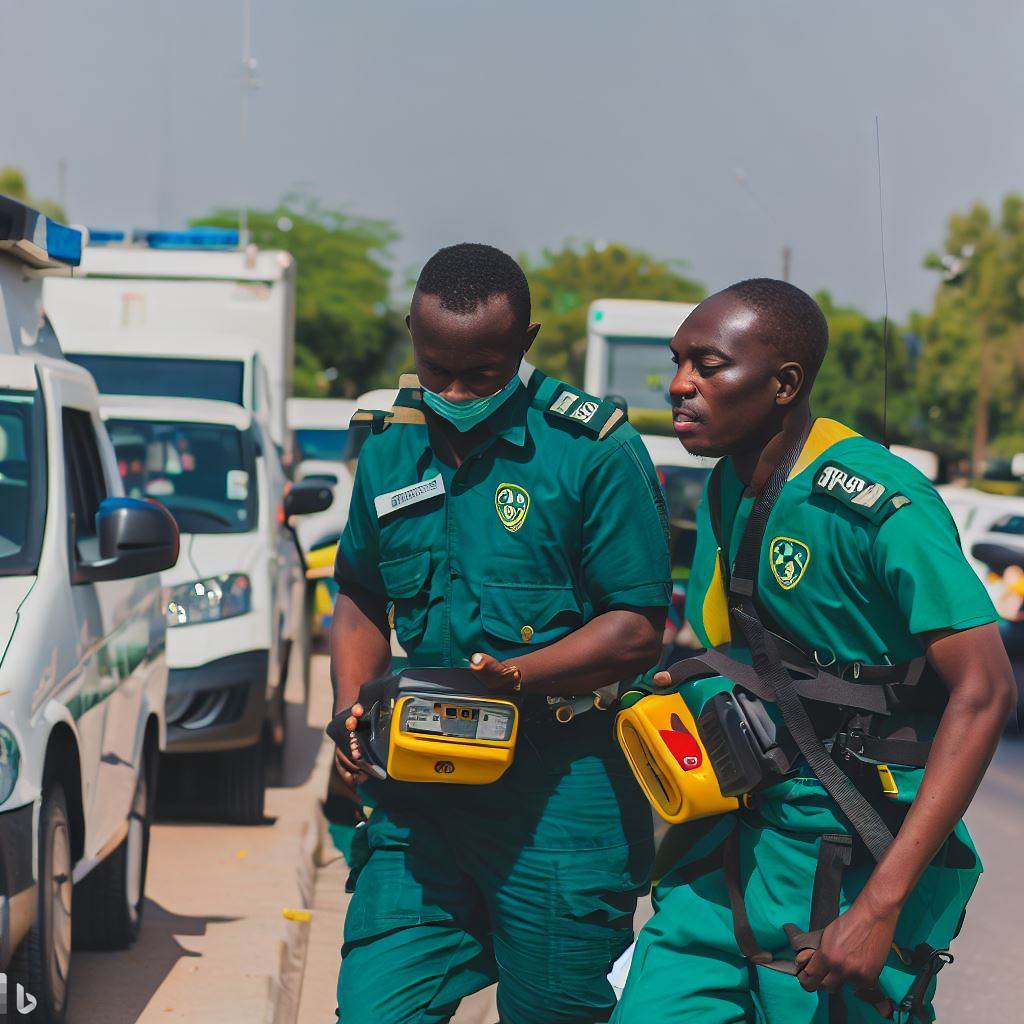Introduction
Volunteerism in Nigerian paramedicine plays a crucial role in providing healthcare services.
Volunteerism is essential in the healthcare sector as it addresses the shortage of medical professionals and enhances community health.
The main objective of this blog post is to discuss the significance of volunteerism in Nigerian paramedicine.
The Current State of Paramedicine in Nigeria
Challenges Faced by the Nigerian Paramedicine System
- Lack of adequate funding for paramedicine services and infrastructure.
- Inadequate training and education of paramedics leading to a lack of skills and knowledge.
- Poor coordination and communication between paramedics and other healthcare professionals.
- Limited access to medical supplies, equipment, and ambulances in remote areas.
- Inefficiency and slow response time due to traffic congestion and road infrastructure problems.
Shortage of Paramedics and Healthcare Professionals
- Insufficient number of paramedic training programs and educational institutions in Nigeria.
- Limited job opportunities and low salaries for paramedics, leading to a lack of motivation and interest.
- Inadequate recruitment and retention strategies for paramedics in both urban and rural areas.
- Brain drain as highly qualified paramedics choose to work abroad for better opportunities.
- Increasing demand for paramedicine services due to a growing population and health emergencies.
Need for Alternative Solutions to Address this Issue
- Investment in the development of paramedic training programs and curriculum to enhance skills.
- Collaboration between government agencies, healthcare institutions, and international organizations to provide financial support.
- Incentives such as competitive salaries, career advancement opportunities, and improved working conditions.
- Establishment of mobile healthcare units and telemedicine services to reach remote areas.
- Partnership with academic institutions and foreign universities to exchange knowledge and expertise.
Read: A Day in the Life of a Nigerian Paramedic: Personal Stories
Overview of Volunteerism in Nigerian Paramedicine
Volunteerism and its significance in the healthcare context
Volunteerism is the act of offering one’s time and skills for the benefit of others without monetary compensation.
In the healthcare context, volunteerism plays a crucial role in providing additional support, resources, and services.
Volunteers contribute to improving patient care, reducing healthcare costs, and enhancing community well-being.
They offer their expertise, compassion, and time to assist healthcare professionals in delivering quality care.
Volunteerism complements the existing healthcare system and helps address resource limitations and inequities.
The concept of volunteer paramedicine and its role in Nigerian healthcare
Volunteer paramedicine refers to trained individuals who provide emergency medical services voluntarily.
These volunteers offer their expertise in pre-hospital care, emergency response, and medical assistance. In Nigeria, where the healthcare system faces multiple challenges, volunteer paramedics fill critical gaps.
They assist in emergencies, provide basic medical care, and support the overwhelmed healthcare infrastructure.
Volunteer paramedicine creates a supplementary workforce that complements the efforts of professional paramedics.
How volunteerism can help bridge the gap in the paramedicine workforce
The paramedicine workforce in Nigeria often lacks sufficient numbers of trained professionals. Volunteerism steps in to mitigate this shortage by offering additional manpower and support.
Volunteers undergo training and certification, equipping them with necessary skills to assist in emergencies.
They enhance the response time, provide immediate care, and stabilize patients before reaching hospitals.
By engaging volunteers, Nigerian paramedicine can extend its reach and maximize healthcare access.
Volunteerism helps ensure that every individual in need receives prompt medical attention, regardless of location.
These volunteers offer a network of compassionate caregivers who are readily available in challenging situations.
Moreover, volunteer paramedics serve as ambassadors, raising awareness about health issues in communities.
They promote preventive measures, educate populations, and empower individuals to prioritize their well-being.
Volunteerism fosters community engagement, encouraging collective responsibility for healthcare outcomes.
In the end, volunteerism holds immense significance in Nigerian paramedicine. It provides vital support in the healthcare context, addressing resource limitations, and improving patient care.
Volunteer paramedics play a valuable role by filling gaps in the workforce and offering immediate medical assistance.
By bridging these gaps, volunteers ensure access to quality healthcare, enhance response time, and empower communities to prioritize well-being.
Volunteerism, therefore, emerges as a crucial component in building a robust and inclusive healthcare system in Nigeria.
Read: The Impact of COVID-19 on Paramedics in Nigeria
Benefits of Volunteerism in Nigerian Paramedicine
The positive impact of volunteerism on the healthcare system
Volunteerism in Nigerian paramedicine provides additional manpower to the healthcare system. Volunteers help relieve the burden on healthcare professionals, allowing them to focus on critical cases.
Increased volunteer participation leads to improved emergency response time and patient care.
Volunteerism enhances the efficiency and effectiveness of healthcare services, benefiting both patients and medical staff.
Through volunteerism, the healthcare system can reach underserved areas and provide essential medical assistance.
How volunteering can enhance the skills and knowledge of paramedics
Volunteers gain valuable hands-on experience in real-life emergency situations, improving their practical skills.
By working alongside experienced paramedics, volunteers have the opportunity to learn from their expertise.
Volunteering allows paramedics to develop critical decision-making skills and quick problem-solving abilities.
Exposure to diverse medical cases during volunteer work expands the knowledge base of paramedics. Regular interaction with other healthcare professionals fosters a culture of continuous learning and growth.
The personal and professional development opportunities for volunteers
Volunteerism in paramedicine offers individuals a chance to give back to their community and make a meaningful impact.
Volunteers develop empathy, compassion, and interpersonal skills through interaction with diverse patient populations.
Working in high-pressure situations during volunteer work helps volunteers build resilience and emotional strength.
Volunteerism provides networking opportunities and connects individuals with professionals in the healthcare field.
Through volunteering, individuals gain a sense of fulfillment, personal satisfaction, and a deeper understanding of healthcare challenges.
In short, volunteerism plays a crucial role in Nigerian paramedicine by positively impacting the healthcare system, enhancing the skills and knowledge of paramedics, and offering personal and professional development opportunities for volunteers.
The active participation of volunteers not only benefits the community but also contributes to the overall improvement of the healthcare sector in Nigeria.
Read: Road to Becoming a Successful Paramedic in Nigeria
Challenges and Barriers to Volunteerism in Nigerian Paramedicine
The cultural and societal factors that may hinder volunteerism
Cultural norms in Nigeria often prioritize paid work over volunteer activities, making it challenging to find volunteers.
Societal emphasis on individual achievement and financial gain can discourage individuals from volunteering their time. Traditional gender roles may limit the participation of women in volunteer paramedicine.
Some communities may have a perception that healthcare services should be provided by the government, reducing the demand for volunteer paramedics.
The lack of proper recognition and support for volunteer paramedics
Volunteer paramedics often face a lack of appreciation and acknowledgement for their invaluable contributions.
There is a need for better mechanisms to recognize and reward volunteer paramedics to encourage sustained involvement.
Government and healthcare institutions should collaborate to establish clear pathways for career advancement and professional development for volunteers.
Training programs and certifications should be made available to enhance the skills and effectiveness of volunteer paramedics.
Potential financial and logistical difficulties
Limited funding and resources pose significant challenges for volunteer paramedicine in Nigeria. Without proper financial support, it is difficult to recruit and retain volunteers in paramedic roles.
Logistical constraints, such as inadequate transportation and infrastructure, can hinder volunteer paramedics’ ability to reach remote or underserved areas.
Collaboration with government agencies and NGOs can help address financial and logistical barriers by pooling resources and expertise.
Read: Exploring Paramedic Training Opportunities in Nigeria

Successful Volunteer Programs in Nigerian Paramedicine
Existing volunteer programs in Nigerian healthcare institutions
- Lagos State Emergency Management Agency (LASEMA) Volunteer Program: LASEMA provides an opportunity for volunteers to assist in emergency response and disaster management.
Volunteers undergo training and are equipped to handle various paramedic duties. This program has significantly strengthened the emergency response system in Lagos. - Red Cross Society of Nigeria: The Red Cross Society has a volunteer program that focuses on healthcare and emergency services.
Volunteers receive training in first aid, disaster management, and basic life support. They actively participate in providing medical assistance during emergencies and promoting community health.
The effectiveness and contributions of these programs
- Enhanced Emergency Response: Volunteer programs have contributed to an improved emergency response system in Nigerian paramedicine.
With the assistance of volunteers, response time has been reduced, saving precious lives in critical situations. - Increased Coverage: These programs have provided additional manpower to healthcare institutions, ensuring better coverage, especially in underserved areas.
Volunteers have allowed paramedics to reach remote locations quickly and provide necessary medical aid. - Community Engagement and Education: Volunteer programs create opportunities for community engagement and education.
Volunteers organize health camps, conduct awareness campaigns, and provide health-related training to members of the community.
This not only improves health literacy but also helps in preventing emergencies through preventive measures.
Examples of volunteers making a significant impact in paramedicine
- Mr. Ahmed’s Life-Saving Intervention: Ahmed, a volunteer paramedic, arrived at a roadside accident scene and provided immediate medical attention to a critically injured victim.
His prompt intervention and expert care saved the victim’s life before the ambulance arrived. Ahmed’s dedication and skills demonstrate the impact volunteers can make in paramedicine. - Volunteer Team’s Role in Disaster Management: During a recent flood in Nigeria, a team of trained volunteers supported paramedics and emergency responders.
They helped evacuate affected individuals, provided emergency medical aid, and coordinated relief efforts. Their contribution ensured a more efficient and effective disaster response. - Volunteer-Run Mobile Clinics: Several organizations run mobile clinics in underserved communities, thanks to volunteers.
These clinics provide basic medical care, health screenings, and vaccinations to those who cannot access healthcare facilities.
The continuous presence of dedicated volunteers in these clinics has improved health outcomes in these communities.
All in all, volunteer programs in Nigerian paramedicine have shown great success and effectiveness in enhancing emergency response, increasing coverage, and engaging communities.
The dedication and contributions of volunteers have made a significant impact in saving lives and improving overall healthcare.
These programs serve as valuable models for other healthcare institutions and countries to adopt.
With continued support and recognition, volunteerism in Nigerian paramedicine can play a crucial role in tackling healthcare challenges and ensuring better healthcare access for all.
Read: Top Institutions to Study Phlebotomy in Nigeria
How to Get Involved in Volunteerism in Nigerian Paramedicine
Steps individuals can take to become volunteer paramedics
- Research the requirements and qualifications needed to become a paramedic in Nigeria.
- Seek out paramedic training programs or courses that are accredited and recognized in the country.
- Complete the necessary training and obtain the required certifications and licenses.
- Identify local hospitals, clinics, or emergency response organizations that accept volunteer paramedics.
- Submit applications and follow the application process outlined by the chosen organization.
Information about organizations and platforms that facilitate volunteerism
- Contact the Nigerian Red Cross Society and inquire about their volunteer paramedic opportunities.
- Explore local non-profit organizations dedicated to emergency medical services and see if they offer volunteer programs.
- Join online forums and social media groups focused on emergency medical services in Nigeria to connect with like-minded individuals and learn about volunteer opportunities.
- Consider reaching out to local hospitals, clinics, or emergency medical service providers directly to express your interest in volunteering.
Advice for overcoming challenges and maximizing the volunteering experience
Prepare yourself physically and mentally by maintaining a healthy lifestyle and staying up-to-date with medical knowledge and skills.
Develop good communication and teamwork skills as collaborating with other paramedics and healthcare professionals is crucial in the field.
Be flexible and adaptable to different situations and environments as emergency medicine often requires quick thinking and problem-solving.
Build strong relationships with fellow volunteers and professionals in the field for networking and continuous learning opportunities.
Take advantage of any training and educational opportunities offered by the organization or platform facilitating your volunteerism.
Always prioritize the safety and well-being of the patients, yourself, and your fellow team members during volunteering activities.
Document and reflect on your experiences to enhance personal growth and contribute to the improvement of paramedicine in Nigeria.
By following these steps and utilizing the available resources and platforms, individuals interested in volunteerism in Nigerian paramedicine can make a meaningful contribution to emergency medical services in the country.
The volunteering experience can be both personally fulfilling and impactful in improving healthcare outcomes for Nigerian communities.
Gain More Insights: Celebrating Notable Dietitians and Their Contributions in Nigeria
Conclusion
Volunteerism plays a crucial role in Nigerian paramedicine by addressing the shortage of healthcare professionals and improving access to medical services for underserved communities.
The benefits of having volunteer paramedics are immense, as they provide essential medical assistance, save lives, and contribute to the overall improvement of public health in Nigeria.
I encourage readers to consider volunteering in paramedicine and making a difference in the lives of those who need medical help the most.
By volunteering, we can create a positive impact and work towards a healthier Nigerian society. Together, let’s make a change in paramedicine through volunteerism.




